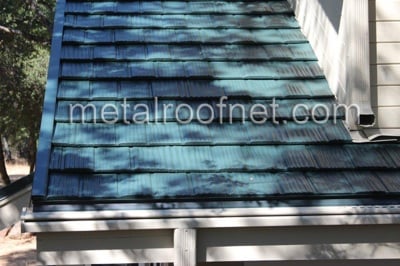 Here's a question recently asked in the comment sections of our blog post, "How to Save Money by Using Metal Roofing Over Your Existing Roof." Our visited wanted to know:
Here's a question recently asked in the comment sections of our blog post, "How to Save Money by Using Metal Roofing Over Your Existing Roof." Our visited wanted to know:
What's the difference in insulation value between metal roofing and asphalt shingles?
Interesting question - and not one we normally hear. The most technically accurate answer to this question is that there's practically no difference in the insulation value of metal and asphalt. By the most common definition of insulation value, neither has any significant amount.
When the insulation value of a building material is measured, it most often refers to the ability of that material to resist heat transfer through its section. The slower heat can move across a section of the material, the higher its insulation value. This rate of heat movement is also referred to as the “R” value, and the higher the R value, the better a material insulates. The R values of both metal roofing and asphalt shingles are negligible, but this is not to be confused with energy efficiency. Energy efficiency is a totally different consideration when it comes to roof material selection.
Both metal and asphalt roofs are most commonly directly exposed to the sun, and as a result both absorb and release heat. For any given roof exposure, the amount of heat absorbed and the rate at which that heat is conducted into the building beneath can have a significant affect on the energy efficient of the roof construction. Transferring heat into a building you’re trying to cool is generally a bad thing - even worse if you’re spending money on air conditioning. Reducing heat conduction from the exposed roof into the attic can save money.
When exposed to the sun, both metal and asphalt will both conduct heat to the deck, but in the case of an Energy Star metal roof, the amount of heat will be less. Asphalt roofs are made of petroleum asphalt and mineral granules (aka “dirt”) and this black, dense material will absorb a lot of heat from the sun. Because an asphalt roof is usually two or three times the weight of a metal roof, it will accumulate at least two or three times as much heat. And because it’s literally stuck together on top of a solid roof deck, a significant amount of this heat is then transferred into the building beneath. It’s actually part of the design of asphalt shingles that they transfer heat to the roof deck below - it’s part of the cooling system that they need because heat is what destroys asphalt roofing shingles. If they didn’t transfer heat to a roof deck, they would actually decompose and disintegrate faster than they already do!
The bottom line is that a metal roof (especially one featuring a heat-reflective finish like an Energy Star coating) is much more efficient as a roof material, but not because it insulates. Rather, it's because it doesn’t absorb and transfer as much heat into the home or building someone’s trying to cool.
Have a burning roofing question? Publish a comment below and we'll reply with a blog post answering it. Or use our Talk to a Roof Expert form.



